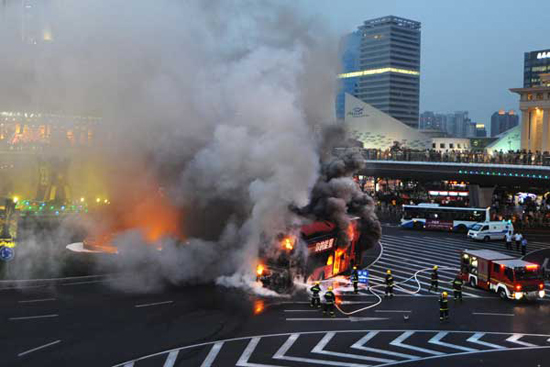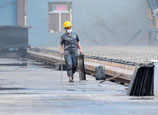
 |
| A double-decker sightseeing bus caught fire in the Lujiazui area of Shanghai's Pudong district on July 8. High summer temperatures have contributed to an increase in vehicle fires. (Photo by Zhu Lan/Xinhua) |
Related news: Tour bus catches fire in Shanghai
High summer temperatures have caused 20 to 30 percent more vehicle fires than in other seasons, experts said.
Yu Genling, an official from Wenzhou Fire Station, was commenting on a series of recent vehicle fires across the country.
To decrease the possibility of accidental fires, Yu reminded the general public that lighters, especially disposable lighters, should never be left in a vehicle.
"My lighter exploded earlier last week as it was forgotten in my leather bag, which was left in the sun inside my car, but luckily, it didn't cause a fire," he said.
In Shanghai, an ambulance caught fire near Yan'an road and Loushanguan road at about 10 am on July 9.
It was the second vehicle to burst into flames in the city within two days.
On July 8, a double-decker sightseeing bus caught fire around 7 pm in the Lujiazui area of Shanghai's Pudong district. The fire started in the vehicle's engine bay, and firefighters extinguished the blaze after 30 minutes.
No casualties were reported in either accident.
Zhou Meiliang, spokesman for the Shanghai firefighting authority, said high temperatures in the city contributed to the vehicles catching fire.
"Accidents where vehicles catch fire happen throughout the year with summer the high incidence season," he said.
Zhou said the results of investigations into the causes of the recent vehicle fires haven't come out yet but that oil leaks, electrical short-circuits or storing combustible goods in the car are three common firestarters.
A taxi caught fire while being driven and burnt the driver slightly in Shanghai on June 19. A privately owned Passat car also caught fire while being driven on June 26, causing widespread congestion at the city's South-North Viaduct.
Zhang Xingliang, a salesman at a Shanghai car dealership, said insufficient car maintenance can contribute to the aging of auto parts and lead to spills of engine oil and brake fluid, sparking a fire.
"Electrical short-circuits may also ignite the car in other cases," he said, adding that's why it is important to have cars serviced every 5,000 kilometers and change the oil on a regular basis.
"Plastic parts or decorations inside the car may also melt and become a potential safety loophole as they expand with heat," Zhang added.
To avoid similar accidents, Ying Haifeng, who is in charge of vehicle management for one of Shanghai's oldest sightseeing bus operators Big Bus Tour, said two brand-new buses with modern safety protection system to prevent spontaneous combustion would be put into use by the end of the month.
"Unlike a fire extinguisher, the spherical-shaped prevention device is installed in the rear engine so that when the engine reaches a certain temperature, it will automatically work to prevent a potential fire," Ying said.
















 College student car models show youthful vigor
College student car models show youthful vigor


![]()
